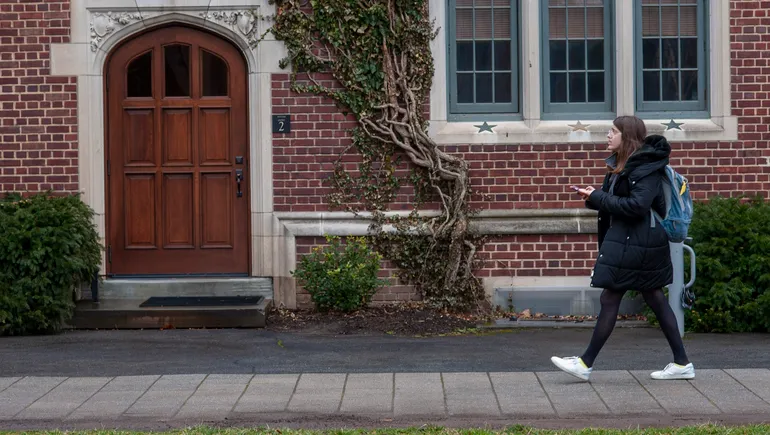Recently, my family and I visited New Orleans where we enjoyed walking through its historical and distinct districts. We found ourselves in one area that was lined with antique shops on both sides of the street and that stretched for a few blocks. Each shop showcased various gold and crystal artifacts in their windows but after a while all the shops blurred together due to the similarity of its contents and décor. The repetitive scenery quickly led us to becoming detached from our surroundings and each other.
But, just then, one of the shop windows caught our attention…this window was not like the others as four stuffed animals sat playing poker. The scene was so unexpected and playful it drew us out of our slump, grounded us in the moment, and, well, got us to go inside!
Exhibit 1: Animals enjoying a game in an antique shop.

At times, our students may feel that their college classes are repetitive and dull and find themselves just as detached as my family and I had become on our journey. So, I recommend we adopt this antique shop’s method of operations – let us be unexpected in our approach to what we do! Let’s bring a little play or playfulness into our spaces in different and unique ways. You will have fun in creating these moments and it will benefit your students. I know you may be thinking that play is an activity for children, but in his book “Play”, author Stuart Brown reminds us of the positive benefits of play in adulthood, which include reducing stress, fostering relationships, and enhancing one’s mood. (Brown, 2020) Now I’m not saying that we scrap all our lesson plans in lieu of board games, but we should consider when, where, and how to interject some play, and playfulness, into our courses.
Make An Impression!
We may not have a storefront window to attract attention, but we do have something that students see before the start of the semester that can grab their attention, set the tone, and get them excited about entering the class…your syllabus!
Students often perceive this course document to be dry and lengthy (perhaps a justified opinion). So be unexpected by injecting a little playfulness into this document and you don’t have to be an artist to achieve this. Simply let your personality and creativity lead the way -maybe what will make yours stand out is your unique tone, visual elements, or corny jokes! Just make it the helpful, informational document it has been but with a playful and personal twist. For example, I was definitely on the “Barbie” train after enjoying the cultural “femomenon” from Greta Gerwig last summer and decided to adopt that theme for my syllabus (and I had a blast doing it and carrying the theme throughout the whole semester).
Exhibit 2: Thompson’s Barbie themed class syllabus (Spring 2024).
Something unexpected resulting from this document was retention! A student confided in me that just before the start of the semester they were contemplating dropping the class. However, when they received my syllabus, their anxiety decreased, and they felt it was the right decision to stay in this class, because they could tell this would be a unique experience.
Let Them Play!
Carry your playful spirit throughout the semester by incorporating play wherever possible. Here are some things I have tried:
- Games: It is no secret that people enjoy playing games and it is no secret that many instructors have already successfully employed games in their classes. Titles that we recognize like Jeopardy and Family Feud are frequently modified for reviewing course topics. But let’s not limit ourselves to the classics! We need to be on the lookout so we can continue to incorporate new games to keep up the excitement in the classroom.
I am a fan of the various puzzles offered by the New York Times (NYT). Their puzzles include the Wordle, Connections, and so much more. One of their new games in beta is called Strands and has been described as ‘part Spelling Bee, part Mini Crossword and part word search.’ I have been enjoying this game personally, so I decided to modify it to help review a topic we were covering. When I introduced the puzzle to the class, some were already familiar with the NYT Strands game and were excited to hear we would be playing it in class. Now, not all students are familiar with the game, so I explain the rules (and it was even better to have a student familiar with the game go over the rules as it was less work for you and may provide a confidence boost to the student explaining the material).
Exhibit 3: Modified ‘NY Times Strands Puzzle’ for introductory accounting topic.
During our games, the classroom is full of energy, discussion, and high spirits. I just love the positive energy created from these activities and try to keep the energy up especially if we have a particularly challenging topic ahead of us. It is as David Franklin said in his book, “Invisible Learning”, “as the captain of the boat, if you know a headwind is going to pick up later on in the day, you aim to make as much progress as you can while the wind is behind you”. (Franklin, 2021)
- Pub Trivia: Nothing creates a more wide-eyed group of students than when I unexpectedly call out “now it’s time for some pub trivia!” Images of pints and silly quiz questions abound, but this is the classroom! No bar drinks here but doing a fun group quiz is a great way to rally the class around an informal lesson review. At my local pub, we do trivia where the Quiz Master calls out questions, and the teams write their answers on a small dry-erase board. It’s always fun to see the answers each team has as they hold up their boards when time is called. So, I adopted this format into my class, putting students in quick groups of 4-5 and passing out an 8.5 x 11 whiteboard and marker to each group. Each time I’ve done this, I adjust the questions (and sometimes throw in some classic, silly pub-trivia style questions amid the lecture topics). I also give out little prizes. This is one of my favorite forms of play, as it incorporates group work, competition, and we have a lot of fun!
- Escape Room: Perhaps I do get an even wider-eyed group of students when I unexpectedly call out, “Now, it’s time for an escape room!” Images of locked doors and puzzles abound, but I’m not advocating for locking students in a room(!!), only to create a series of puzzles for them to solve regarding topics from your course. Once they successfully complete the series of puzzles, they can “escape” whether that means getting to leave early, obtaining a small prize, or simply getting a certificate saying, “I escaped the dreaded Accounting Escape Room!”, is totally up to you.
Now, this “escape room” is not a traditional one – there are no artifacts for them to open with codes or furniture to break open (I still lack the budget for that – but maybe someday). I organize the puzzles as a series of worksheets. Once the groups believe they have completed a worksheet (by entering the four-digit code requested at the bottom), they check their work with me. If it is correct, I say that have “unlocked that puzzle” and may continue to the next one as I hand them a new worksheet. This process is a fun way for students to complete a rather lengthy analysis and also encourage check-ins at key milestones to make sure they are on the right track before continuing. You could even set this up as an out-of-class individual assignment or group assignment.
Stay Playful!
Switch up activities as this helps keep students engaged. Distracted author, James Lang, encourages educators to be a bit unpredictable in our classroom activities (Lang, 2020). Consider varying the structure of your class and avoid always starting with same activity. After all, change is the spice of life that can help bring new experiences and new attention to make life more enjoyable.
I know that changing our activities can be a lot of work, but I believe it will also prove fun for you! Many of us teach the same classes semester after semester, and often in the same pattern. This change will help bring new experiences, attention, and enjoyment to you, too. Students will also appreciate your work in keeping your subject engaging and approachable. Last semester, I had a student write anonymously, “I would take this class again for the memories”. To me, this means that students ended the semester feeling good; so good they would return to take additional accounting classes! And in his book Play, Stuart Brown defined play as a self-motivating activity that makes you want to do it again. So, create opportunities for play and playfulness in your classroom; your students will be more engaged, happy, and want to return for more of your classes!
Teresa Thompson has enjoyed 17 years in higher education and is a tenured accounting professor at West Valley College in Saratoga, California. She first discovered her enthusiasm for teaching as a tutor at her community college, where she assisted peers with subjects like statistics, Spanish, and, of course, accounting. Thompson always knew she wanted to return to the community college level to teach full-time.
Thompson loves being in the classroom and is known for her innovative and engaging teaching methods. From a Pokémon-themed syllabus to a ‘Squid Games’ escape room, she loves integrating pop culture into her assignments to make learning fun and memorable. She has received the Excellence in Teaching, Service to the Community, and Program Excellence awards from her college as well as being awarded the White House’s Gold Presidential Award for Community Service. Beyond teaching, Teresa serves as the director of West Valley College’s Entrepreneurship Center. In this role, she collaborates with brilliant and passionate students, helping them turn their dreams into reality. In her spare time, Teresa loves traveling with her husband and daughter. She also enjoys snuggling up with her two-toned, one-eyed cat, Rex, to read mystery novels.
References
Brown, S. (2020). Play. Avery Publishing.
Franklin, D. (2021). Invisible Learning. Kindle Direct Publishing.
Lang, J. M. (2020). Distracted. Basic Books.
function getCookie(cname) {
var name = cname + “=”;
var decodedCookie = decodeURIComponent(document.cookie);
var ca = decodedCookie.split(“;”);
for(var i = 0; i <ca.length; i++) {
var c = ca[i];
while (c.charAt(0) == " ") {
c = c.substring(1);
}
if (c.indexOf(name) == 0) {
return c.substring(name.length, c.length);
}
}
return "";
}
// check cookies for 70747
var x = getCookie("ipro_articles");
//alert(x);
//document.getElementById("subscribe-article-nag").style.display = "block";
if (x){
var articles = x.split(",");
var length = articles.length;
//alert("length="+length);
if (x.search("70747") == -1){
// post not in cookie
//alert("post not in cookie");
if (length == 2){
document.getElementById("ombld").style.display = "block";
document.getElementById("omdlvr").style.display = "none";
var f = getCookie("ipro_final");
if (! f) {
document.getElementById("elementorpopup").value = "69829";
document.cookie = "ipro_final=1; expires=Fri, 22 Nov 2024 12:00:00 UTC; path=/; domain=;";
//__gaTracker("send", "event", "cta", "popup", "Final", "1");
}
}
else{
document.cookie = "ipro_articles="+x+",70747; expires=Fri, 22 Nov 2024 12:00:00 UTC; path=/; domain=;";
document.getElementById("ombld").style.display = "none";
document.getElementById("omdlvr").style.display = "block";
}
if (length == 1){
document.getElementById("elementorpopup").value = "69829";
//document.getElementById("elementorpopup").value = "69824";
}
if (length == 2){
document.getElementById("elementorpopup").value = "69829";
}
if (length == 3){
document.getElementById("elementorpopup").value = "69829";
}
}
else{
// article in cookie
//alert("article in cookie");
document.getElementById("ombld").style.display = "none";
document.getElementById("omdlvr").style.display = "block";
if (length == 1){
//document.getElementById("elementorpopup").value = "69824";
document.getElementById("elementorpopup").value = "69828";
//document.getElementById("elementorpopup").value = "69829";
//__gaTracker("send", "event", "cta", "popup", "Article1", "1");
}
if (length == 2){
//document.getElementById("elementorpopup").value = "69828";
document.getElementById("elementorpopup").value = "69829";
}
if (length == 3){
document.getElementById("elementorpopup").value = "69829";
}
}
}
else{
// cookie not set, should be first article
//alert("cookie not set, should be first article");
document.cookie = "ipro_articles=70747; expires=Fri, 22 Nov 2024 12:00:00 UTC; path=/; domain=;";
document.getElementById("ombld").style.display = "none";
document.getElementById("omdlvr").style.display = "block";
//document.getElementById("nag-one-remaining").style.display = "block";
//document.getElementById("nag-none-remaining").style.display = "none";
//document.getElementById("elementorpopup").value = "69824";
document.getElementById("elementorpopup").value = "69828";
//document.getElementById("elementorpopup").value = "69829";
//__gaTracker("send", "event", "cta", "popup", "Article1", "1");
}
The post The Unexpected Benefits of Play appeared first on Faculty Focus | Higher Ed Teaching & Learning.
#Unexpected #Benefits #Play










